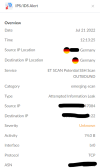DReffects
Basic Pleskian
- Server operating system version
- AlmaLinux release 8.6 (Sky Tiger)
- Plesk version and microupdate number
- Version 18.0.45 Update #1
Hello There!
I urgently have to migrate two servers to a new one and am unable to use both the Plesk Migrator and a manual backup restore.
The Plesk migrator gets stuck with "
I've searched through the forums and tried the following:

My next step was to create a domain based backup on the source server and manually added the subscription to the new server and then tried to restore from backup.
While there is no hard error during restore i get the following warning:
Both E-Mail and Databases seem to be restored fully - but i am missing ALL website data, including the httpdocs directory. Therefor this process is stuck as well.
I've tried to disable all php handlers serverwide and also disable php before restoring from backup but i cannot get past this error message.
I both of this issues with both source servers.
Source 1 is a CentOS Linux 7.9.2009 (Core) running Plesk Obsidian Version 18.0.44 Update #3
Source 2 is a CentOS Linux 7.9.2009 (Core) running Plesk Obsidian Version 18.0.45
Destination Server is a AlmaLinux release 8.6 (Sky Tiger) deployed from a previous CentOS8 installation and is running Plesk Obsidian Version 18.0.45 Update #1
All help is HIGHLY appreciated!
I urgently have to migrate two servers to a new one and am unable to use both the Plesk Migrator and a manual backup restore.
The Plesk migrator gets stuck with "
Code:
Failed to fetch basic information about resellers, clients and domains data from source servers
Cause: Command execution failed on the local server with non-zero exit code.
command: rsync -l --chmod=Fu=rw,Du=rwx,go= --timeout=30 -e 'ssh -i /usr/local/psa/var/modules/panel-migrator/sessions/20220720161015/ssh-keys/id_rsa.XX.XX.XX.81 -p 22 -o PasswordAuthentication=no -o StrictHostKeyChecking=no -o GSSAPIAuthentication=no' /usr/local/psa/var/modules/panel-migrator/sessions/20220720161015/agent-config.source.json [email protected]:/root/plesk_migrator/plesk_migrator-zpv14zvwlj7w57b4om0jvjzmvm4b3pgf/pmm_agent/config.json
exit code: 30
stdout:
stderr: [sender] io timeout after 30 seconds -- exiting
rsync error: timeout in data send/receive (code 30) at io.c(195) [sender=3.1.3]
That is a critical error, migration was stopped.I've searched through the forums and tried the following:
- Disabled SELinux ("setenforce 0")
- Disabled iptables and plesk firewall
- In /etc/ssh/sshd_config
- UseDNS no
- PermitRootLogin yes
- PasswordAuthentication yes
My next step was to create a domain based backup on the source server and manually added the subscription to the new server and then tried to restore from backup.
While there is no hard error during restore i get the following warning:
Code:
Execution of /usr/local/psa/admin/plib/api-cli/domain.php --update XXXXXX.com -guid cbf6f65f-aa47-4400-a524-2eb2ebef0fb7 -creation-date 2007-01-10 -description '' -hosting true -hst_type phys -do-not-apply-skeleton -ip XX.XX.XX.XX -www-root httpdocs -login XXXXXX_com -passwd '' -passwd_type sym -hard_quota 0B -shell /bin/false -ignore-nonexistent-options failed with return code 1.
Stderr is
An error occurred during domain update: An error occurred during changing of hosting settings: System user update is failed: Unable to execute usermng: usermng: /usr/sbin/usermod execution failed:
usermod: user XXXXX_com_cucbqd0z9x5 is currently used by process 48517
usermng: Unable to modify user: XXXXX_com_cucbqd0z9x5Both E-Mail and Databases seem to be restored fully - but i am missing ALL website data, including the httpdocs directory. Therefor this process is stuck as well.
I've tried to disable all php handlers serverwide and also disable php before restoring from backup but i cannot get past this error message.
I both of this issues with both source servers.
Source 1 is a CentOS Linux 7.9.2009 (Core) running Plesk Obsidian Version 18.0.44 Update #3
Source 2 is a CentOS Linux 7.9.2009 (Core) running Plesk Obsidian Version 18.0.45
Destination Server is a AlmaLinux release 8.6 (Sky Tiger) deployed from a previous CentOS8 installation and is running Plesk Obsidian Version 18.0.45 Update #1
All help is HIGHLY appreciated!


